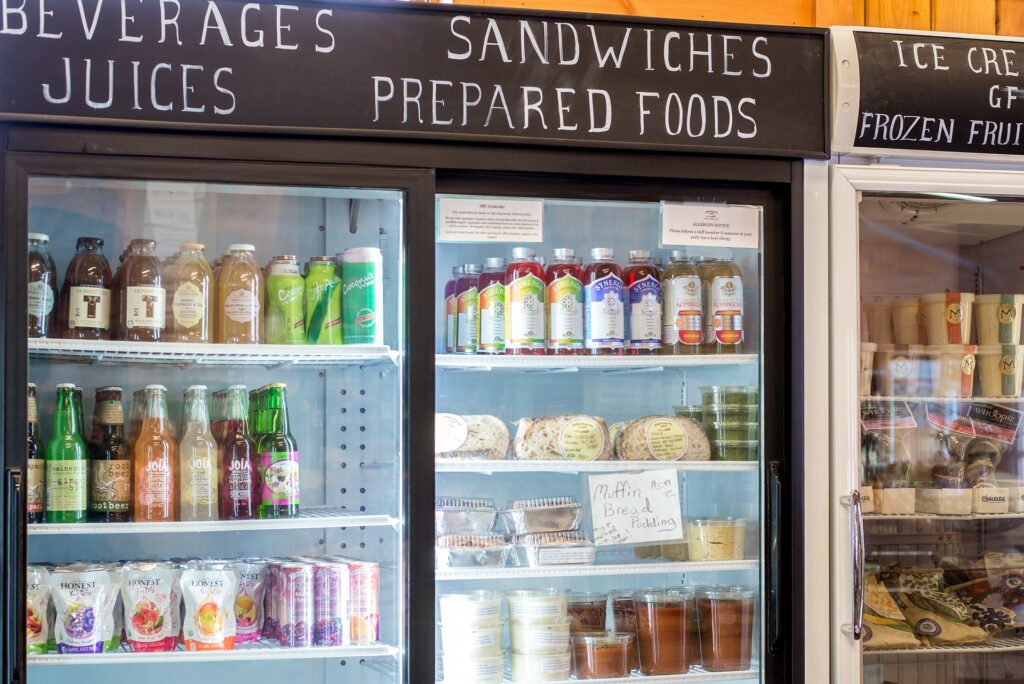Bridging The Knowledge Gap & Driving Innovation For A Healthier Food System
Our Goal
To support mission-driven companies tackling the challenges facing our food system, building a stronger and more sustainable food system.
How We Do It
We Build
Join our community as we bring together hundreds of innovators, leaders and professionals in the food industry together through summits and other networking opportunities.
We Educate
Gain access to our annual comprehensive food industry reports, and weekly industry updates. Take advantage of different learning opportunities we provide to stay ahead and stay informed.
We Strategize
Work with our financial analysts and business consultants, gain deep business insights and industry projections.
Discover The Most Outstanding Innovators, Join Us In-Person In NYC
Articles

For Founders: Seize this Moment to Raise Capital
By Bunmi Olayanju MBA CFA
While the headlines have been awash with talk of a venture capital winter, it’s crucial to understand that it’s merely a season, not a barren period. The data shows that while the pace of fundraising might have decelerated in the past year and a half, there’s still a robust ecosystem of deals being struck across stages. For founders who can present their businesses credibly and compellingly, now could be an opportune time to secure the capital they need.
Let’s delve into why the current fundraising climate holds promise:
Abundance of Dry Powder: Latest data from Q1 2023 shows VC firms in the U.S. sitting on a staggering $303B in uninvested capital, a figure nearly double that of pre-pandemic levels. This reservoir indicates there’s ample capital seeking worthy ventures.
Momentum-driven Investments: After a period of caution, investors are eager to finish the year on a strong note or begin the new one with vigor. Given that VC earnings are closely tied to the multiples on their invested capital, there remains a consistent interest in bankrolling promising startups. Angellist’s Q3 2023 data underscores this, revealing a notable uptick in investment activity.
Favorable Valuations: Recent trends show startup valuations undergoing a correction, reaching some of the most investor-friendly levels in recent history. Lower valuations allow investors to reduce their investment costs, making their desired returns more achievable. Q3 2023 reports from AngelList and Carta suggest that median valuations remained consistent or even edged higher across venture stages compared to the preceding quarter. Furthermore, AngelList’s Q3 VC report points out that valuations, particularly in the early stages, might have hit a floor, offering a potential uptick in the near future. For investors, this presents a lucrative window to enter before valuations surge.
The Angel Impact: Angel investors, especially in the early stages, have become indispensable. Data from Carta highlights that checks amounting to less than $25,000 constituted between 31% and 59% of all pre-seed capital raised in the first half of 2023. This engagement level is poised to rise with the sizable accredited investor base in the US and the increasing adoption of angel special purpose vehicles (SPVs), which offer a simplified and efficient medium for angels to pool resources and back startups collectively.
In conclusion, while cyclical downturns in venture capital can create an atmosphere of apprehension, they often conceal underlying opportunities. The current climate, with its abundance of uninvested capital, investor eagerness to achieve momentum, attractive valuations, and the significant role of angel investors, makes a compelling case for founders to actively pursue their fundraising initiatives. Armed with the right strategy and a clear understanding of the evolving investment landscape, founders can effectively navigate this VC winter, turning prevailing challenges into unparalleled opportunities.
Bunmi Olayanju MBA CFA is a finance expert and investor. Visit here to learn more about him
Directions To Joseph B Martin
Direction by train/public transport
From Airport
Take shuttle (Routes 22, 33, 55 or 66) from airport to Blue Line Airport Station towards Bowdoin. Take it for 4 stops and get off at Government Station. Go upstairs & transfer to the Green Line D train towards Riverside. Get off at Longwood Station.
D Line Subway
Take Green Line D train to Longwood Station. From station, turn left on to Chapel Street and walk up short hill to Longwood Avenue. Turn left on to Longwood Avenue.
E Line Subway
Take Green Line E train to Longwood Medical Area Station. From stop, proceed down Longwood Avenue toward the hospitals. (It is about a 10 minute walk from the Longwood Medical Area Station.)
47 Bus
Central Square to Cambridge/Albany St. Via South End Medical Area, Dudley Station & Longwood Medical Area Exit bus in front of Children’s Hospital. Proceed down Longwood Avenue toward Huntington Avenue.
CT2 Bus
Kendall Square Station to Ruggles Station Via Longwood Medical Area. Exit bus in front of Children’s Hospital. Proceed down Longwood Avenue toward Huntington Avenue.
8A
Bus Dudley Station to Kenmore Station Via Longwood Medical Area. Exit bus in front of Children’s Hospital. Proceed down Longwood Avenue toward Huntington Avenue.
Directions by car
From South of Boston
Take I-93 North to exit 26 (Cambridge/Storrow Drive). Keep left at the end of ramp and take underpass to Storrow Drive. Follow Storrow Drive approximately 2.5 miles to Kenmore Square exit (on left). Bear right at end of exit ramp into Kenmore Square. Take leftmost fork at intersection onto Brookline Avenue. Follow Brookline Avenue approximately 1 mile (Beth Israel Hospital will be on the left) until Longwood Avenue. Take left on to Longwood Avenue and follow approximately ¼ mile.
From West of Boston
Take I-90 East (Massachusetts Turnpike) to exit 18 (Cambridge/Allston). Bear right after toll booth at end of exit ramp. Turn right after lights (before the bridge) onto Storrow Drive. Follow Storrow Drive (about one mile) to Kenmore Square exit. Bear right at end of exit ramp into Kenmore Square. Take leftmost fork at intersection onto Brookline Avenue. Follow Brookline Avenue approximately 1 mile (Beth Israel Hospital will be on the left) until Longwood Avenue. Take left on Longwood Avenue and follow approximately ¼ mile.
From North of Boston
Take I-93 South to exit 26 (Storrow Drive/North Station). Keep left at end of ramp and take underpass to Storrow Drive. Follow Storrow Drive approximately 2.5 miles to Kenmore Square exit (on left). Bear right at end of exit ramp into Kenmore Square. Take leftmost fork at intersection onto Brookline Avenue. Follow Brookline Avenue approximately 1 mile (Beth Israel Hospital will be on the left) until Longwood Avenue. Take left on Longwood Avenue and follow approximately ¼ mile.
From Logan Airport
Take Rte. 1A South through Sumner Tunnel after leaving Logan Airport. Watch for detour signs that periodically direct traffic north before allowing access to Rte. 1A South. After tunnel, turn right onto I-93 N. Follow I-93 N about 1/4 mile to exit 26 (Cambridge/Storrow Drive). Keep left at end of ramp and take underpass to Storrow Drive. Follow Storrow Drive approximately 2.5 miles to Kenmore Square exit (on left). Bear right at end of exit ramp into Kenmore Square. Take leftmost fork at intersection onto Brookline Avenue. Follow Brookline Avenue approximately 2 miles (Beth Israel Hospital will be on left) until Longwood Avenue. Take left on Longwood Avenue and follow approximately ¼ mile.
Reckitt’s Mead Johnson, Abbott Cleared by US Court in Infant-formula Case: Food Safety and Health Headlines

Food Safety and Health
Reckitt’s Mead Johnson, Abbott Cleared by US Court in Infant-formula Case – Just Food
Reckitt Benckiser’s Mead Johnson unit and Abbott Laboratories have been cleared by a Missouri court relating to claims certain brands of their premature infant formula can cause a serious gut condition.
Authorities Find Source of E. coli outbreak in Iceland – Food Safety News
Health officials in Iceland have found the source of a Shiga toxin-producing E. coli (STEC) outbreak that sickened more than 20 children.
CFIA Rebukes Silk Co-manufacturer in Listeria Outbreak Inquiry – Dairy News Today
Canada’s food safety regulator, the Canadian Food Inspection Agency (CFIA), has rebuked Joriki, a co-manufacturer of plant-based milk for brands such as Danone’s Silk and Walmart’s Great Value, following an investigation into a listeria outbreak.
NGOs Charge EU to Tighten up Laws for Mercury Levels in Tuna – Just Food
Non-profits Foodwatch and Bloom Association have called on the European Commission to tighten rules on the sale and advertising of tuna products containing high levels of mercury.
Metal Pieces in Bread and Buns Prompts Recall in Canada – Food Safety News
Wonder Brands Inc. is recalling various brands of bread and buns because of pieces of metal in the products.
Lifeway Foods Rejects Danone’s $283M ‘Opportunistic’ Takeover Offer: Funding and Acquisition Headlines

Funding Acquisition and Finance News
Lifeway Foods Rejects Danone’s $283M ‘Opportunistic’ Takeover Offer – Food Dive
Lifeway Foods rejected a Sept. 23 offer by Danone to acquire the kefir maker for about $283 million, or $25 a share. Danone, a long-time shareholder in Lifeway, currently owns 23.4% of its common shares.
UpSnack Brands Acquires Pipcorn and Spudsy – FoodBev Media
UpSnack Brands has acquired the assets of Pipcorn Heirloom Snacks, a better-for-you salty snack brand known for its use of heirloom corn, and Spudsy, a company specializing in upcycled sweet potato snacks.
BRF to Acquire 26% Stake in Addoha Poultry – Just Food
Brazil-headquartered meat major BRF has signed a binding agreement to acquire a 26% stake in Saudi Arabia-based Addoha Poultry Co.
Lactalis USA to Increase Feta Production With $55M Investment – FoodBev Media
Lactalis USA has announced plans to invest $55 million to increase the volume of Président feta cheese produced in the US.
Celsius Holdings Boosts Innovation, Production Capacity With $75M Co-packer Purchase – Food Dive
Celsius Holdings spent $75 million to acquire Big Beverages Contract Manufacturing, a long-time co-packing partner.
Big Idea Ventures Announces Six New Investments – FoodBev Media
Big Idea Ventures has announced six new company investments through the Global Food Innovation Fund II (GFIF II).
1440 Foods Acquires Protein Bar Brand Fitcrunch – Just Food
1440 Foods, a company holding a collection of sports and active nutrition brands, has acquired the protein bar brand Fitcrunch for an undisclosed sum.
Kellanova Sales Rise as Shareholders Approve Mars Merger – Food Dive
Kellanova signaled a strong outlook for 2025 after seeing higher demand for its snack products in its most recent quarter. The Pringles maker, which agreed to be acquired by Mars for $36 billion in August, saw a 6% increase in organic sales year-over-year and a 16.1% increase in profits.
Kilcoy Global Foods Buys Australia Burger Factory From Tyson Foods – Just Food
Private-equity-owned Kilcoy Global Foods (KGF) has acquired a burger factory in Australia from Tyson Foods.
